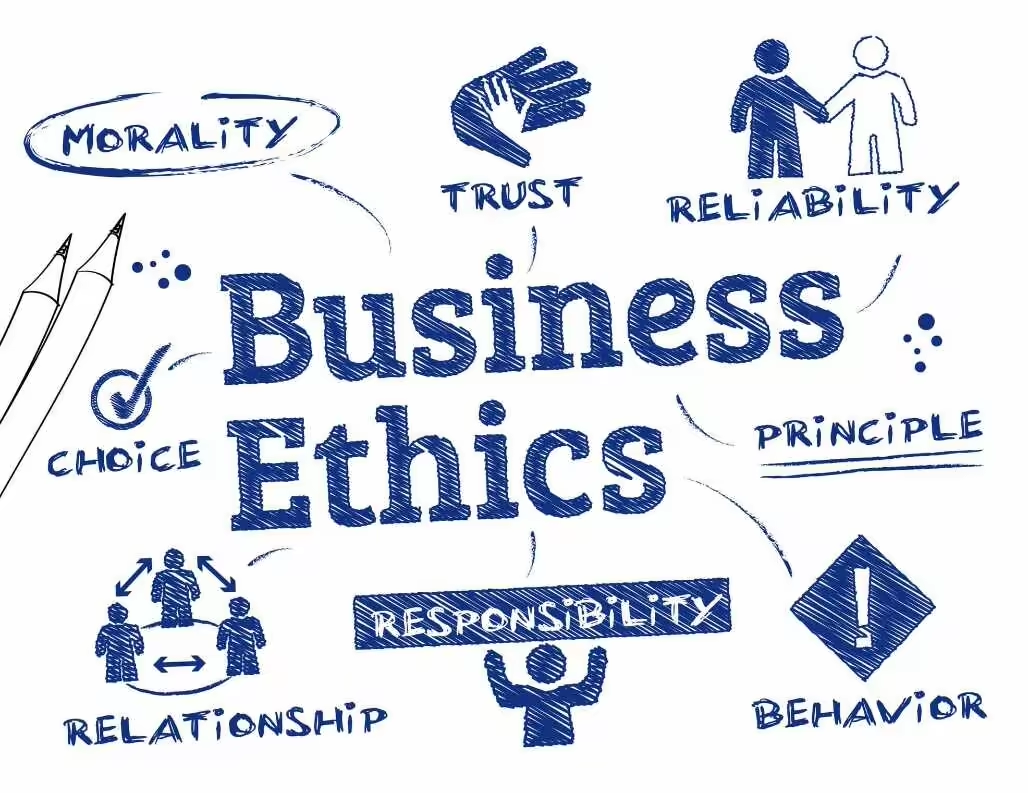What is Business Ethics?
Over the years, business ethics has been defined in various ways. The most appropriate ones are from Crane (2007) and Baumhart (1968). "Business ethics is the study of business circumstances, activities, and decisions where concerns of right and wrong are addressed," says Crane. Baumhart explains, "Business ethics is the ethics of duty. The businessman must promise that he would not intentionally cause harm." This article explores business ethics examples and their benefits to organizations.
In today's competitive business landscape, ethics play a crucial role in shaping the behaviour of organizations and their leaders. Business ethics examples encompass the moral principles, values, and standards that guide businesses' decisions. It involves considering the impact of business practices on various stakeholders, such as employees, customers, shareholders, suppliers, and the community. Business ethics goes beyond legal compliance and focuses on doing what is right and fair. It sets the foundation for sustainable and responsible business practices that benefit both the organization and society as a whole.
Business Ethics Examples
Ethical business practices are essential for building trust, maintaining reputation, and fostering long-term success. In today's competitive and rapidly changing business landscape, the importance of business ethics cannot be overstated. Let's take a look at some business ethics examples in action.
Corporate Social Responsibility (CSR):
CSR is a concept that involves businesses taking responsibility for their impact on society and the environment. Many companies are now integrating CSR into their operations and decision-making processes. For example, Patagonia, an outdoor clothing brand, is known for its commitment to environmental sustainability. The company donates 1% of its sales to environmental organizations, encourages customers to repair their products rather than buy new ones, and uses recycled materials. The business ethics example demonstrates ethical business practices by prioritizing the environment's and society's well-being.
Fair Labor Practices:
Ensuring fair labor practices is a crucial aspect of business ethics. Companies that prioritize fair treatment of their employees and suppliers demonstrate ethical behaviour. While some organizations may consider using polygraph tests to maintain integrity within their workforce, it's important to note that the Employee Polygraph Protection Act (EPPA) prohibits most private employers from using lie detector tests for pre-employment screening or during employment.
For example, in 2020, Microsoft announced it would be carbon negative by 2030 and remove its historical carbon emissions by 2050. Additionally, Microsoft committed to paying a living wage and providing benefits such as paid leave and parental leave. This demonstrates a commitment to ethical labour practices by prioritizing fair treatment of workers throughout the supply chain.
Transparent Communication:
Transparent communication is another important element of business ethics. Companies that are open and honest in their communication with stakeholders build trust and credibility. For example, when Johnson & Johnson faced a major product recall in 1982 due to tampered Tylenol bottles that resulted in deaths, the company immediately communicated the issue to the public. It recalled all Tylenol products from the market. This transparent and swift action demonstrated ethical behaviour by prioritizing consumer safety and public health over potential financial losses.
Diversity and Inclusion:
Embracing diversity and inclusion in the workplace is crucial to ethical business practices. Companies that promote diversity and inclusion demonstrate a commitment to fairness, equality, and respect for all individuals. For example, Salesforce, a leading cloud computing company, has a Chief Equality Officer and has made diversity and inclusion a core part of its corporate culture. The company actively works towards pay equality, promotes diversity in leadership roles, and provides resources for employees to report any instances of discrimination or harassment. This demonstrates ethical behaviour by creating an inclusive work environment where all employees feel valued and respected.
Ethical Marketing:
Ethical marketing practices involve promoting products and services truthfully and responsibly. Companies that engage in ethical marketing prioritize consumers' needs and interests. For example, the Dove "Real Beauty" campaign challenged traditional beauty standards and promoted body positivity by using diverse models in their advertisements. This campaign highlighted ethical marketing practices by promoting positive body image and challenging harmful beauty stereotypes.
Data Privacy and Security:
With the increasing use of technology and data in business, protecting the privacy and security of customer and employee data has become a critical ethical consideration. Companies prioritizing data privacy and security demonstrate ethical behaviour by safeguarding sensitive information. For example, Apple has implemented strict privacy policies and practices to protect user data, including end-to-end message encryption and differential privacy techniques to collect data without compromising individual privacy. This demonstrates ethical behaviour by prioritizing user privacy and security.
Related: Why Ethics in Organisations are Important
Benefits of Business Ethics
Practising some of the listed business ethics examples above is crucial for companies looking to build a strong reputation and maintain long-term success. It helps to establish trust with customers and employees, leading to increased profitability and improved relationships with stakeholders. Below we explore some of the key benefits of business ethics and why companies need to prioritize ethical behaviour in their operations.
Related: The Advantages of Ethical Behaviour in Business
Enhanced Reputation and Brand Image
Reputation is a valuable asset for any business, and ethical behaviour is crucial in building and maintaining a positive reputation. Businesses prioritizing ethics are perceived as trustworthy and reliable, enhancing their brand image. Customers, employees, investors, and other stakeholders are more likely to engage and do business with companies known for their ethical practices. A good reputation and brand image also provide a competitive advantage in the market, as customers are more likely to choose a company with a strong ethical track record over its competitors. A good business reputation is vital to potential customers since it reflects dependability and honesty. Customers are willing to spend more when doing business with organizations with a solid reputation.
Increased Customer Loyalty
Ethical business practices foster customer loyalty. Today's consumers are more conscious of businesses' social and environmental impact, and they prefer to support companies that align with their values. Businesses that demonstrate social responsibility, fair labour practices, and environmental sustainability are more likely to attract and retain loyal customers. Customers are more likely to purchase from ethical businesses repeatedly, improving the company's earnings over time. Customers are also more likely to recommend ethical businesses to others, leading to positive word-of-mouth marketing and increased customer referrals.
Engaged and Loyal Employees
Employees are the backbone of any organization, and ethical business practices are crucial in building a positive work culture. Companies with a strong ethical culture are 467% more likely to have a positive impact on their employees, according to Gitnux. Employees find satisfaction in working for ethical organizations that value and treat their employees fairly. Ethical businesses prioritize fair treatment, diversity and inclusion, and provide a safe and respectful work environment, which results in higher employee morale, motivation, and job satisfaction. Employees who perceive that their organization operates with integrity and values ethics are more likely to be engaged, committed, and loyal to their company. Engaged and loyal employees are more productive, creative, and less likely to leave the organization, increasing employee retention and cost savings associated with recruitment and training.
Stronger Relationships with Stakeholders
Businesses do not operate in isolation; they have relationships with various stakeholders, including investors, suppliers, partners, and the local community. A more ethical atmosphere improves interactions with those inside and outside the company, and stronger interactions lead to better business outcomes. Investors are increasingly considering the ethical practices of businesses before making investment decisions. Suppliers prefer to do business with ethical companies and treat their suppliers fairly. Socially responsible businesses that contribute positively to the local community are more likely to gain support and goodwill, which can have long-term benefits.
Related: Of Greed, Profit and CSR: Ethics in Business
In conclusion, practising the abovementioned business ethics is critical for an organization's long-term success and sustainability. Companies prioritizing ethical practices demonstrate their commitment to responsible and sustainable business behaviour. From corporate social responsibility to fair labour practices, transparent communication, diversity and inclusion, ethical marketing, and data privacy and security, numerous examples of ethical business practices can guide companies to make responsible and ethical decisions. Ethical business practices are essential for building trust, maintaining reputation, and fostering long-term success. By upholding strong ethical values and practices, businesses can contribute positively to society, build trust with stakeholders, and foster a culture of integrity within their organizations.



